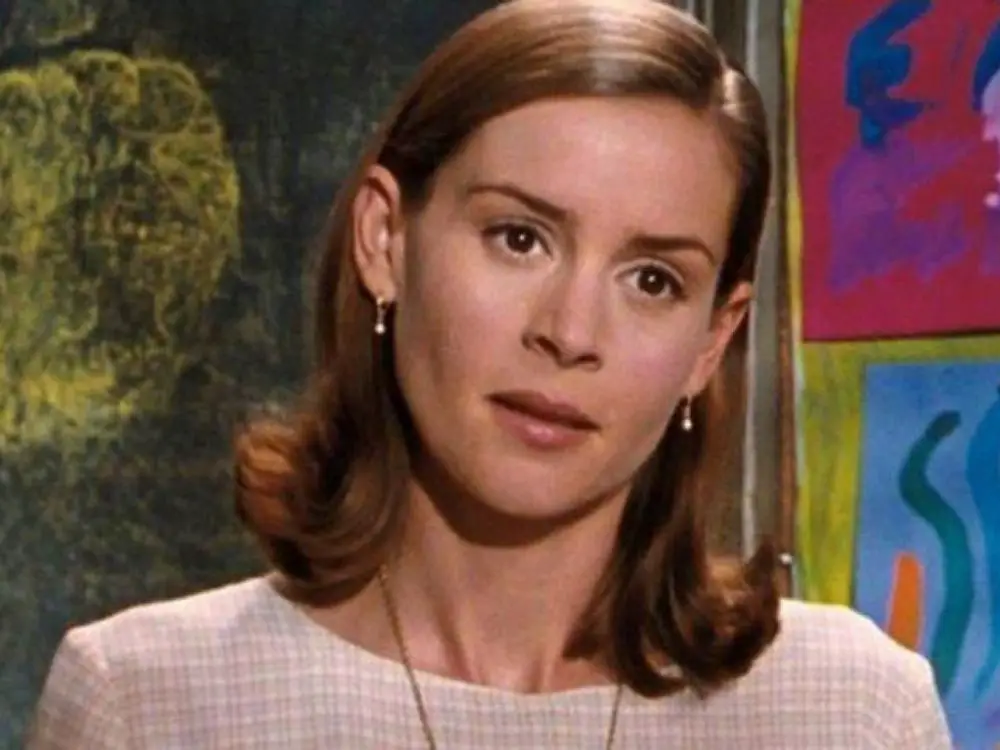Part of realizing that I was bisexual came from watching the 1996 film “Matilda” when I was 10 years old. The moment Miss Honey (Embeth Davidtz) stepped onscreen, I found myself mesmerized. She was the most beautiful woman I’d ever seen. I adored her dresses, her headbands and her effortlessly coiffed hair. She was the epitome of grace, kindness and sensitivity while also demonstrating strength and resiliency. I was enthralled.
I’m not alone in this admiration. On Twitter, Mara Wilson, who starred as Matilda, answered the question of why lesbians love the movie so much. She wrote, “It was one of the few children’s films to show a strong, resilient female character overcome adversity and a family that did not understand her to create her own family and her own happiness through hard work and friendship…Also, they all have crushes on Miss Honey.”
Other Twitter users also agree that Miss Honey is not straight. “I truly believe Miss Honey from the movie Matilda was a lesbian,” one user wrote. “Miss Honey from Matilda was a lesbian, I said what I said,” wrote another.
It was one of the few children’s films to show a strong, resilient female character overcome adversity and a family that did not understand her to create her own family and her own happiness through hard work and friendship.
Also, they all have crushes on Miss Honey. https://t.co/E69yR3pfmG
— Mara Wilson (@MaraWilson) June 27, 2018
Miss Honey remains unmarried throughout the film, without a romantic interest at any point, male or female. She adopts Matilda at the end of the film, and they form their own family with just the two of them. They happily live in Miss Honey’s perfect cottage for the rest of Matilda’s childhood.
The cottage contributes to the speculation surrounding Miss Honey’s sexuality. The cottagecore aesthetic, characterized by idealizations of countryside living, gardening, retro dresses and wild nature, has become increasingly prevalent in the last few years. Miss Honey’s cottage and her lifestyle perfectly embody this trend. Cottagecore is also incredibly popular among members of the LGBTQ+ community, particularly for queer women.
The cottagecore connection helps explain the sapphic allure of Miss Honey. “She’s also basically an early prototype of a cottagecore lesbian. And most importantly, she is unmarried. She’s staunchly a ‘Miss,’ she lives by herself, she doesn’t express desire to be married … When you’re desperately trying to find queerness and queer representation, you were often relying on the absence of heterosexuality rather than the explicit presence of queerness,” comedy writer Bec Shaw said in an interview with Michelee Rennix in Junkee.
In the 1990s, there was limited representation for queer women onscreen. Like Shaw illustrates, Miss Honey’s lack of heterosexuality does not necessarily indicate a clear example of homosexuality, but the absence leaves room for the viewer to imagine Miss Honey as a lesbian. Representation is important, especially for queer kids growing up with no support or LGBTQ+ role models. If Miss Honey can be that onscreen role model for kids, despite no blatant evidence of her sexuality, it’s a good thing.
Some viewers have decided that Miss Honey is the progenitor of sapphic cottagecore culture. “Perhaps it’s because of her little cottage in the woods or maybe it’s the fact that she’s just very clearly far too smart for men, but with the emergence of the cottagecore aesthetic, people have crowned Miss Jennifer Honey the original cottagecore lesbian. A true cottagecore trendsetter before the trend even existed,” Rennix wrote in Junkee.
Twenty years before the trend, Miss Honey made everyone fall in love with the simplicity of cottage life and coexisting with nature, which likely contributes to the popularity of the trend, as many of us grew up with “Matilda.”
Given that “Matilda” came out over 20 years ago, it makes me wonder if a remake will ever appear. “Matilda” was a smash hit and a quintessential part of people’s childhoods, so it makes sense that Hollywood would want to capitalize on that success and remake it for a new generation.
If that happens, I want to implore the filmmakers to clearly make Miss Honey a lesbian. This change will not alter the plot in any way that deviates from the original message of the movie. If anything, it will only enhance it. Miss Honey can still be an independent woman who manages to build her own happy life away from the pain of her broken upbringing, while also going a journey to understand herself and her own sexuality.
If anything, it adds even more depth to Miss Honey’s character. Romance doesn’t have to become the heart of the film, as it should remain focused on Matilda’s growth, but it would bring a slightly more mature dimension to the plot for fans of the original movie who have grown older.
Making Miss Honey canonically gay will also offer much needed representation for queer girls. It will show those struggling with their sexuality that it’s OK to deviate from the heteronormative structure of society, and that whoever you are and whoever you love is OK.

















